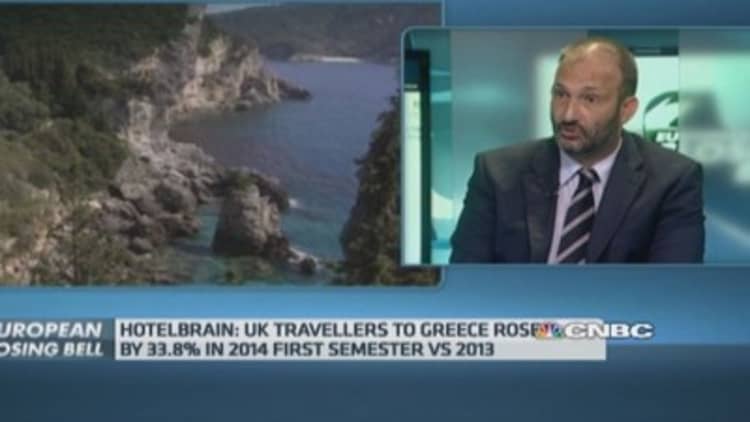It may be time for U.S. tourists to pack their bags for destinations abroad—and they have the dollar to thank.
On Friday, the U.S. Dollar Index hit its highest level since March 2009. The 's strength against other major currencies has presented opportunities for American travelers to jet off to more exotic places. The dollar's bull run, especially against European and Asian currencies, has made buying goods and leisure travel more affordable in those countries.
As a turbulent year draws to a close, the might dollar is holding the top. With other currencies battered by sluggish growth and volatile oil prices, analysts at Goldman Sachs this past week predicted the greenback's surge would extend through 2018.
Read MoreWhy the dollar is still king
To be certain, the dollar's strength is problematic for places like the euro zone and Japan. A swooning currency can stir inflationary pressure at a time when Europe is trying to re-inflate its economy with a flood of cheap money. Currency weakness also makes it tougher to repay dollar-denominated debt. In addition, U.S.-based multinational companies take a hit when translating their earnings from foreign currencies back into dollars.
Still, the bright side of the global turmoil is that for Americans at least, it makes traveling abroad more affordable. Because of this, it's an opportune time to wine, dine and shop in locations such as Tokyo, Paris and Beijing.
Irish castles and Japanese iPads
The year 2014 was a rough one for Europe's common currency, which has depreciated against the dollar by over 10 percent. Yet during that time frame, travelers trekking through Europe could find some great deals on Italian leather shoes, or even afford a rented stay in an Irish castle for a few nights.
Read More When gas prices drop, America goes on vacation
Liberty Travel listed Italy and Ireland as notable destinations that have seen an increasing number of American travelers in the last year. Some tourists have also been drawn to European rivers.
"River cruising through Europe continues to be one of the fast-growing segments of the business, with country-specific trips coming in at a close second," Carla Caccavale Reynolds of Liberty Travel told CNBC in an email.
The Australian dollar, which traded near-parity toward the middle of the year, has since slipped in the last quarter to depreciate by over 10 percent against the dollar.
That's been a boon to tourism in Australia, which has seen a 16 percent increase in leisure travel and a 7 percent boost in travel spending. A November report from Tourism Australia attributed the tourism gains to stronger consumer confidence and a weaker Aussie dollar.
"They certainly help in putting Australia on top of the visiting wish list," Tourism Australia Vice President Jane Whitehead said. "We are seeing stronger confidence across the board, which is certainly helping from that perspective."

The U.S. dollar has appreciated more than 14 percent over the Japanese yen in the last year, making food, hotels and even electronics cheaper for American travelers in Japan.
Consider, for example, the Apple iPad 2, which costs $499 in the U.S. In Japan, that same iPad costs 53,600 yen, or just over $450 at current exchange rate near 119 yen. In August, when the exchange rate hovered around 101 yen to the Dollar, the same iPad model would have cost about $530 in Japan.
Naoki Kitazawa, press officer for the Japan National Tourism Organization, said that over the last year—when the yen's slide against the greenback really accelerated— the number of American tourists traveling to Japan increased by 20 percent. He cited the cheaper yen as one of the main reasons, in combination with Japan's push to attract more overseas travelers. Most of the savings come by way of lodging, he said.
"Hotel fare is not expensive," Kitazawa said about popular destinations like Tokyo and Kyoto, but added that airfares on JAL and All Nippon Airways is increasing from last year.
The dollar is expected to remain dominant through 2015, yet the volatility of foreign exchange markets could see cheap travel rates disappear as fast as they arrived.
As a result, some observers think Americans pondering a big trip should act fast.
"2015 should be the year that Americans book their trip to Australia," Whitehead said.

